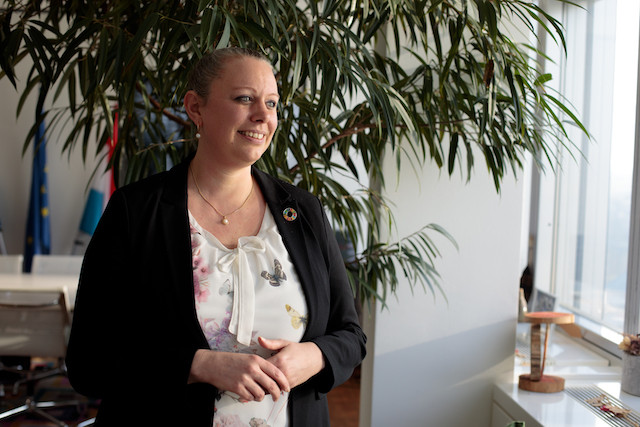How do you remember the nuclear incident at Fukushima?
For me, it was a déjà vu of Chernobyl, which I remember very well. I felt for all the people who lost their homes and livelihoods. But you also immediately think: What would happen if there was a disaster like this at Cattenom, right on our doorstep? It’s terrifying. Nuclear energy always comes with a risk, but public awareness has increased enormously.
Some countries still see it as a cheap, emissions-free source of power. What will it take to change their minds?
It’s a constant battle. Some countries, also in Europe, see nuclear energy as a solution to the climate crisis. That is a fallacy. First, it’s not cheap. Hinkley Point in the UK, for example, will only work out economically at a fixed tariff that is higher than the price for renewable energy. The waste problem hasn’t been solved.
With a nuclear power station, money is locked in for decades and production is centralised. Renewables help make energy more democratic. We want to be more flexible, decentralised and allow people to participate in the energy transition, rather than moving from one energy dependency into another.
The European Commission is technology neutral, leaving it up to member countries to decide whether to use nuclear power. What challenges does this pose?
Luxembourg in recent debates--the EU taxonomy, the European Green Deal and Climate Law--has always tried to keep nuclear wording out of the texts. We must consider scenarios for climate solutions that are 100% renewable. We respect that every country chooses its energy mix. But we cannot accept that Luxembourg public money is invested in nuclear projects as part of EU funds.
Luxembourg still uses nuclear energy in its network. By when would you like to see this phased out?
We are in a free energy market. We cannot dictate to big industrial players where they buy their electricity. What we have achieved is that in the residential domain we are 100% renewable, and that this commitment extends to public players. For the rest, I hope that bit by bit the economic players will pull in the same direction.
You came out strongly against Belgium exploring nuclear waste storage sites near Luxembourg, with the Belgian environment minister citing a “serious diplomatic incident”. Would you react in the same way again today?
I would do exactly the same today. It wasn’t a diplomatic incident. This ministry was officially informed that the consultation procedure had been launched. We are directly affected in the border region and for us that meant we should have been involved from the start, not just informed. There was some disagreement on this, but for us it’s important to respect cross-border cooperation and for us to have our say. One of the potential sites is near our biggest drinking water reservoir; we need to be very clear about this.
France is in the process of exploring lengthening the lifespan of some of its reactors. What do you hope will happen with the Cattenom site in the next ten years?
Obviously, I want Cattenom to close and for there to be no extension. If I look towards the future, the best solution would be a switch to renewables, to new jobs and in favour of a circular economy. It’s about enabling a transition for the people working in this sector, too. Cattenom is a big power station.
We want to think in terms of the Greater Region, and we want to reach our sustainability goals together with our neighbours.
A version of this article was first published in the March edition of Delano Magazine, currently available at newsstands.
